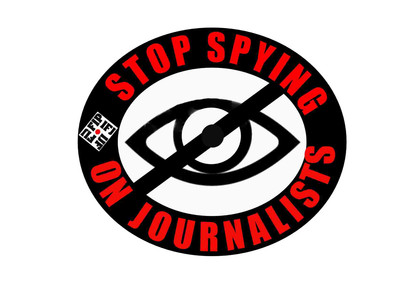The IFJ surveillance of journalists expert group is a body of officials and activists from affiliate unions who monitor and work to combat the covert surveillance of journalists.
We publicise examples of media workers being surveilled, encourage journalists to adopt defensive practices, and lobby governments and international bodies to create conditions where such surveillance is not lawful, not possible, or both.
The group is chaired by Tim Dawson, of the National Union Of Journalists In Britain and Ireland. He can be contacted via the IFJ.
At a meeting on 27 July 2021, and in reaction to recent revelations about the use of NSO’s Pegasus software to spy on journalists, the expert group adopted the following statement. It is seeking its adoption by journalists unions all over the world and will present this statement to national governments and international bodies in the Autumn of 2021.
IFJ Surveillance Expert group statement
“At the heart of much important journalism is the ability to guarantee sources that they may share information in confidence. It is by this means that reporters uncover inefficient bureaucracy, undetected criminality, and the corruption that undermines good governance.
Sophisticated tools of surveillance have the potential to undermine this, either by design or accident.
Digital technology provides multiplying possibilities for state agencies and others to undermine bonds of trust between journalists and their sources. Telephone records may be accessed. Electronic communications can be monitored. Historic information stored on digital platforms can be copied. Facial recognition technology can be used to link individuals in each others company. Artificial intelligence can be deployed to recognise patterns of contact.
The rights of whistleblowers should be defined in law. National and international law should also afford journalists the means to ensure discretion in their work. Where are state agency seeks to compel a journalist is legally required to disclose sources of information or other professionally obtained material, application should be in public and subject to judicial oversight.
Journalists must redouble efforts to safeguard their own data. This must include using multiple phones, including ‘burners’ that are less susceptible to Pegasus’ hacking, as well as adopting ‘tradecraft’ to ensure that their phones do not have the potential to betray their every move and provide a ringside seat for their most sensitive meetings.
The IFJ will urge affiliate unions to organise meetings/seminars of its members in coordination with other relevant professions to debate the right to know what kind of information their government is collecting on its citizens including journalists, on what scale and based on what legality and the scope, meaning or constitutionality of surveillance laws in their country.
Governments must enshrine in domestic law the inviolability of journalists’ communications both abstractly and in the framing of specific laws and regulations such as those on domestic surveillance. Any dilution of such protections should be resisted.
As an expert group we will reach out to lawyers/barristers, the medical profession, social workers, accountants and all other professions that rely on professional confidentiality, and build a strong and coordinated global movement to rein in the unchecked surveillance powers of our governments.
The international community must build a regulatory regime that allows the inspection and regulation of any and all organisations supplying products that have the capacity to undermine such critical freedoms.”


